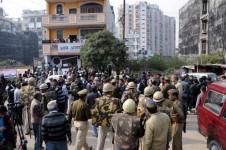Ghaziabad, India: The Aam Aadmi Party(AAP), a political party elected democratically who’s headquarters were attacked on the morning of January 8th in Ghaziabad district located in the outskirts of Delhi. The attack was carried out by a mob of 30-40 Hindu Raksha Dal right-wing activists to protest against AAP leader, Prashant Bhushan’s comment that deployment of army in Jammu and Kashmir should be on the basis of opinion of the people of the state. This attack on Mr. Bhushan is to deter him for supporting minorities and for exercising his right of Freedom of speech and expression guaranteed under the Indian Constitution.
India has tens of thousands of troops stationed in the disputed Kashmir territory. The divided Himalayan region, which is also claimed by Pakistan, has been the scene of a violent insurgency against Indian rule for more than 20 years. Tens of thousands of people have been killed.
This is not for the first time that Prashant Bhushan has faced fire over his remarks on Kashmir. In October 2011, Prashant Bhushan was beaten up by three people inside his chamber in the Supreme Court, because of his comments on the removal of the Armed Forces Special Powers Act from the Kashmir Valley, and for his comments on a plebiscite in Kashmir
Only days later in another isolated incident, members of the AAP were also attacked by 3-4 unidentified people during a membership drive in the southern Indian city of Bangalore.
“Our guys were campaigning near Bellandur on outer ring road when a gang of four to five unidentified men abused and manhandled our people, they were hit,” told AAP’s Karnataka spokesperson Rohit Ranjan.
The AAP was formed a little over a year ago where a group of like-minded people, disenchanted by the way politics works in India decided to take matters into their own hands. The AAP made a stellar debut by coming to power in Delhi after a historic win with 28 out of 70 seats. This after the nation had been expecting the Bhartiya Janta Party (BJP) to obtain a clear majority in Delhi, after 15 years of dissatisfied Congress rule and with the recent rise of BJP’s Narendra Modi.
However, the people’s verdict proved otherwise and the frustration of the members of the right-wing groups and corrupt parties in the helm so far, is clearly seen in these incidents. It is distressing at the same time to see that the offices of the parties of even the Chief Minister of the National Capital are not safe. What can the common man then expect for themselves and their families?
The recent attacks in Delhi and Bangalore can be compared to those carried out by Nazis on the trade union and Communist Party (KPD) offices, homes of left-wingers as well as offices of the Social Democrats, around the German Federal Election of 1933. Engulfed by the violence the ordinary citizen cannot at the same time, expect to live in peace and without fear of risk to their property or themselves.
Will history repeat itself by being witness to more such incidents in the Indian state today?





